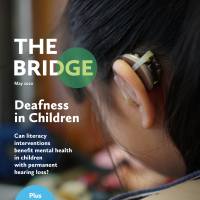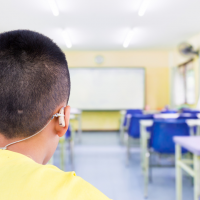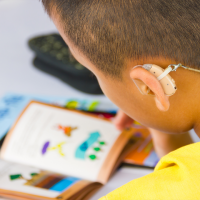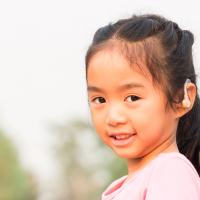CAMHS
-

‘Clinicians’ use of and attitudes towards technology to provide and support interventions in child and adolescent mental health services’
Video abstract from Bethany Cliffe from her paper in the CAMH journal ‘Clinicians’ use of and attitudes towards technology to provide and support interventions in child and adolescent mental health services’. First published: 11 December 2019.
Read more -

May 2020 – The Bridge
Includes general ‘Mental Health in Deaf Children’ and ‘Accessing good communication – Deaf children in a mental health assessment’
Read more -

Multi-disciplinary teams are needed to sensitively diagnose autism in Deaf children
An ethnographic study of NHS professionals, who diagnose autism in Deaf children, finds that recognizing the intersections between mental health and Deaf culture is essential for healthcare professionals to make sensitive diagnoses.
Read more -

Can literacy interventions benefit mental health in children with permanent hearing loss?
Children with permanent childhood hearing loss (PCHL) seem to be at risk of developing emotional and behaviour difficulties, how can literacy interventions help?
Read more -

Integrating interpreters into CAMHS: useful tips for effective co-working
Vicci Ackroyd and Barry Wright have put together a useful set of principals by which British Sign Language (BSL) interpreters, and child and adolescent mental health services (CAMHS) can effectively co-work with each other.
Read more -

Do audiological classification systems cause more confusion than clarity?
The lack of a single classification system is clearly problematic, not least because it renders intervention studies difficult to interpret and has implications for patient access to services.
Read more -

Mental Health in Deaf Children
The most recent study of mental health in deaf children in England showed that 26% in a sample of 144 signing deaf children and young people not currently accessing child mental health services had a probable mental health problem and 57% had a possible mental health problem.
Read more -

Accessing good communication – Deaf children in a mental health assessment
In order for a good mental health assessment to take place there has to be good communication between the two people in the interaction. Prof Barry Wright explains the implications for deaf children.
Read more -

Christian Boakye: What it’s like to be a Speech and Language Therapist
Christian Boakye shares some of his working life as a Speech and Language Therapist working in young offenders institutes.
Read more -

Gillian Davies: What it’s like to be a Speech and Language Therapist
Gillian Davies talks about what it’s like to be a speech and language therapist in the Evelina London Community Speech and Language Therapy service (Guy’s and St Thomas’s NHS Foundation Trust)
Read more